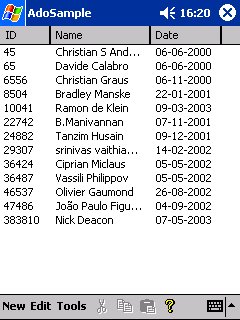
Introduction
One of the questions I have seen most frequently asked in Pocket PC development groups, is how to develop in eVC using ADOCE and Pocket Access. There are some resources on the web for this, but it is hard to find a freely available set of C++ classes that will encapsulate ADOCE 3.1 in complete fashion. After looking in CP, I found a very good candidate.
This article presents a port of Carlos Antollini's popular ADO classes to the Pocket PC. Carlos' article (A set of ADO Classes - version 2.07) presents a fairly thorough coverage of desktop ADO and was selected for porting because it is freely available and it is very popular.
The port
The Pocket PC uses ADOCE 3.1, a cut-down version of the ADO implementation found on desktop computers. The ADOCE 3.1 object model is smaller in both number of objects and methods. Nevertheless, it is quite usable for most database applications, retaining its ease of use.
Source compatibility
One of the objectives of this port was to keep source compatibility. Hence, you will be able to compile the source files (ado.h and ado.cpp) in both platforms: Desktop and Pocket PC. The source compatibility was achieved using precompiler directives, which may render some parts of the code harder to read.
What's missing?
Of all of Carlos' classes, the Pocket PC will only see CADODatabase and CADORecordset. In fact, these are the only classes that have direct ADOCE support. Also, not all of the classes' methods are supported and have been removed. Here is a list of the unsupported methods:
void CADODatabase::dump_com_error(_com_error &e); BOOL CADORecordset::AddNew(CADORecordBinding &pAdoRecordBinding); BOOL CADORecordset::RecordBinding(CADORecordBinding &pAdoRecordBinding); CString CADORecordset::GetString(LPCTSTR lpCols, LPCTSTR lpRows, LPCTSTR lpNull, long numRows = 0);
Also, there are missing items in the CADORecordset::cadoDataType enumeration.
What's new?
During the port I had to add some missing functionalities, the most important of which is UNICODE support.
During the first debugging session I also found that CADORecordset::Open needed a new mode (openUpdate) to allow for correct use of the Update method (see sample code for an example).
Porting warnings
Check that the #import directive in ado.h is correct for your development environment.
The port has not been thoroughly tested. Please help me with this ongoing process.
Using Pocket Access
Pocket Access is a very simple database manager. It is so simple that it will not support the following (among other) desktop features:
- Unique indexes
- Referential integrity
- Advanced SQL statements (almost everything is missing)
Autonum fields
You also have some limitations to note:
- Maximum number of 4 indexes per table
- Maximum of 4 tables per
JOIN - You only get
INNER JOINs
So why use it? It is very simple to setup and synchronize with your desktop environment, and you don't have to pay licensing fees.
Using ADOCE to manage your tables may be trickier than you thought, so I prepared a simple demo application that manages (does not delete - yet) a list of authors of this section. The bulk of the work is in CChildView, a CListCtrl-derived class, where records are created and modified. Please do note the peculiarities of adding new records and updating an existing record.
Sample application
The sample application is provided with full source code and with two versions of the database: desktop (.mdb) and Pocket PC (.cdb). You can create the second from the first, by using ActiveSync. If you only have an emulator to play with, you can copy the .cdb file directly into the \My Documents folder.
I work on R&D for Frotcom International, a company that develops web-based fleet management solutions.
 General
General  News
News  Suggestion
Suggestion  Question
Question  Bug
Bug  Answer
Answer  Joke
Joke  Praise
Praise  Rant
Rant  Admin
Admin 








 , is PB 3.0 the same as Pocket PC 2002 SDK?
, is PB 3.0 the same as Pocket PC 2002 SDK?![Rose | [Rose]](https://codeproject.global.ssl.fastly.net/script/Forums/Images/rose.gif)

 (
(

